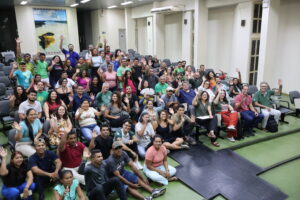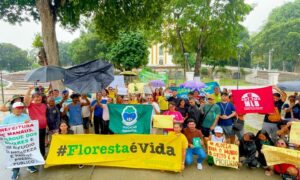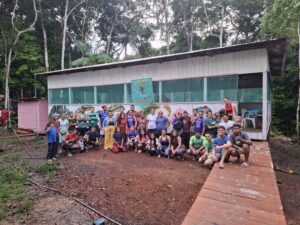The initiative aims to qualify young people to become agents of transformation in their communities
By Maria Cunha
Translated by Bruna Favaro
The Mid-Juruá Territory (TMJ) – which covers two conservation units, the Middle Juruá Extractive Reserve and the UACARI Sustainable Development Reserve – in addition to the fishing agreement area, indigenous lands and protected surrounding areas brings, within its historical framework, references to the struggle for sovereignty and quality of life with the right to remain in the forest. Stories that motivate local youth to continue, in various contexts, on the path to empowerment and leadership.

Based on the principle of social empowerment, the organizations that work in the TMJ realized the need for a leadership training process that would emphasize local youth and motivate the new generation in the territory to multiply and qualify agents of transformation in their communities. The course ‘Political Training for Young Leaders of Mid-Juruá’ started from this context. The initial idea thought up by the organizations was to continue the YOUNG PROTAGONISTS OF MID-JURUÁ project, implemented at TMJ by ICMBio in 2011.
This project highlighted important potentials for local social development by providing opportunities for young people to assume prominent roles within the social movement. It was aimed at the emergence of new leaders in conservation units and their surroundings. However, in accordance with what was idealized for the new generation of leadership, it was necessary to think of a training model that brought the context of education, linked to leadership – strongly represented by the community – and that also highlighted the strengthening of tradition and the rescue of local culture. It was then that the idea of working on a methodology emerged in the context of the BASE EDUCATION MOVEMENT (MEB). This program, created by the Catholic church in 1961, assisted in the educational, social and cultural development of Mid-Juruá, among other extremely important factors. for the social movement in the territory.
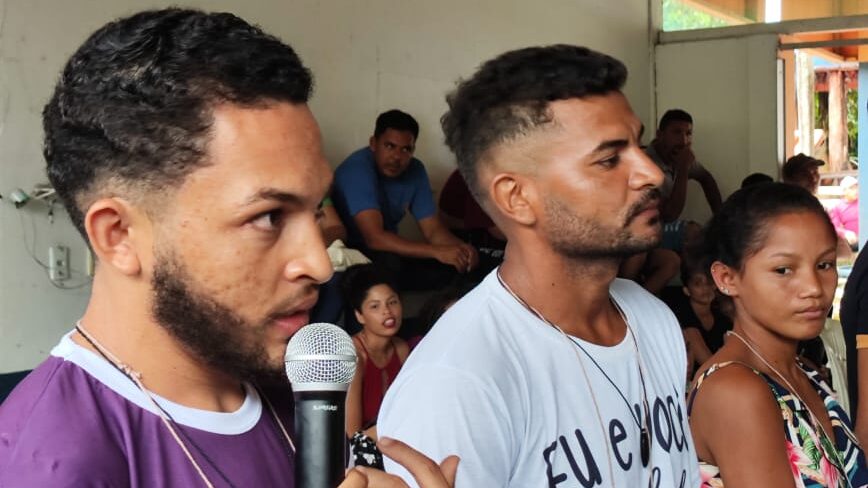
This training allows youth to reconnect with the struggles of the past and, through this, enables leadership guidelines that empower the territory with new opportunities for representation. Themes designed by the young people themselves were the basis for evaluation to define training themes, based on the weaknesses and needs exposed by them. Thus, the current political training course for young leaders in the Mid-Juruá Territory is being carried out with the following objectives:
(i) Understand the role and responsibilities of young leadership in the Amazon region;
(ii) Explore the principles of leadership for building a collective movement;
(iii) Discuss the importance of grassroots organization for local transformation;
(iv) Learn about the struggle of forest people (rubber tappers, indigenous people, managers, extractivists, farmers, among others);
(v) Learn about the history of struggle of the populations of Mid-Juruá;
(vi) Identify examples of megaprojects aiming at development and their consequences;
(vii) Understand the threats and socio-environmental impacts to the Mid-Juruá Territory (National Development Plan in the Amazon);
(viii) Develop skills in the areas of oratory and conflict management;
(ix) Reflect on the process of individual transformation and its role in the collective;
(x) Value youth protagonism;
(xi) Investigate the relationship between climate change and forests (Action – timeline – and what role does youth play?);
(xii) Explore the meaning and implications of the Amazon myth.
Between April 23ʳᵈ and 25ᵗʰ, the community of Bom Jesus, located in the UACARI Sustainable Development Reserve, witnessed the first module of this course (which will have a total of three modules). The training highlights the importance of youth empowerment and investment in programs that qualify young people to become agents of change in their own communities and territories. Initiatives like these inspire young people to take on leadership roles and contribute to sustainable development. With a clear objective of understanding the role and responsibilities of young leadership in the Amazon region, we highlight the initiative to encourage young catalysts for the civic and political engagement of local youth.
“This course was a real inspiration for us, young people in the communities. In this first module, we learned not only about leadership theory, but also about how we can make a difference in our own communities”, shared Mikaele Paixão Figueiredo, a course participant and resident of São Raimundo RESEX Mid-Juruá Community.
The first module brought the themes “Being a leader; Community organization; Democracy and Citizenship” and allowed participants to immerse themselves in a journey of discovery about the meaning and importance of leadership in community organization. The theme of “Being Leadership” established the fundamental foundations for the civic and political engagement of local young people.
The course was organized in partnership with local institutions and organizations and supported by community leaders. It brought together 101 enthusiastic and interested participants to learn the fundamentals of social policy and the challenges faced by community leaders. It is also an opportunity for young people to acquire practical knowledge and skills essential for territorial engagement of each person within their conservation units and communities.
During the module, participants had the opportunity to explore a variety of topics with many dialogues and exchanges of experiences, including the role of young people in the context of “being a leader” and effective communication techniques, also highlighting strategies for exercising an effective leadership – from the unique challenges faced by communities in the region to opportunities for positive impact. Young people were encouraged to reflect on their role as agents of change in their own environments. Furthermore, being a community leader in the Amazon is not easy and never has been. Inspirational lectures were led by knowledgeable leaders who were part of the transformation process of the Mid-Juruá Territory, bringing inspiring and motivational contexts for the new generation of leadership in formation.
Gender equity in leadership was also the focus of dialogue in this first module, in order to ensure fairer and more equitable representation. After all, everyone deserves to have equal opportunities to develop and demonstrate their leadership skills, regardless of gender.
“By exploring topics that are so important for the development of good leadership, I believe that we are enabling these young people (men and women) to become effective leaders committed to the sustainable development of their communities. In addition to bringing the empowerment of women to occupy decision-making spaces.”, said Maria das Neves, course speaker and member of ASMAMJ – Association of Agroextrativist Women of Mid-Juruá.
When women occupy leadership positions, they become powerful role models for other women and girls. This inspires future generations of leaders, helping to break gender stereotypes and build a more equitable future. Gender diversity in leadership has been linked to more effective decision-making and more ethical and responsible management. By integrating different perspectives and leadership styles, organizations become better prepared to face complex challenges and adapt to an ever-changing world, inside and outside their territories.
Indigenous peoples inclusion
In the context of social justice and equity in the political training course for young leaders, the inclusion of indigenous peoples emerges as a crucial aspect. By including indigenous peoples, the course recognizes and values their unique contribution to the sustainable development and conservation of the Amazon as a whole. Furthermore, it strengthens the representation of indigenous communities and villages and promotes an inclusive and holistic approach.
“I see, although we have already suffered a lot, I recognize that we are having our voices heard. And these spaces of opportunity are important for us to speak and for us to hear how much we can be part of this transformation and how much we can be a leader, more prepared to fight for sovereignty and for our rights, being people with our rights respected – ours and our territories!”, mentioned Adriana Lima, indigenous person of the Kulina people and speaker of module 1.
The Mid-Juruá is home to indigenous communities, whose cultural traditions and ancestral knowledge play a fundamental role in preserving the biodiversity and environmental sustainability of the Amazon as a whole. Therefore, it is essential that these communities and villages are always included and represented in the processes of leadership formation, ensuring their voices are heard and respected.
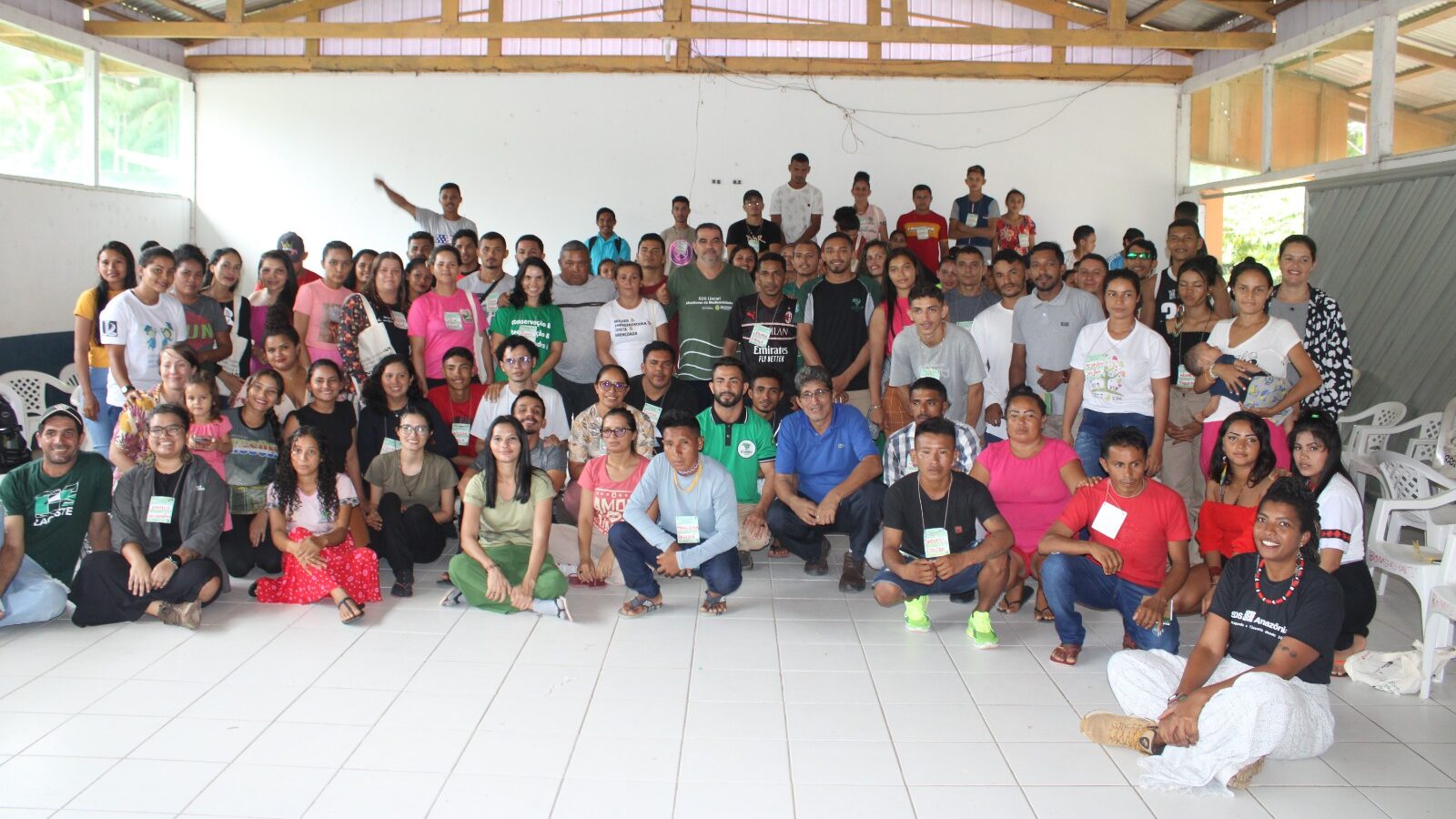
This first module of the course marks a significant step towards promoting the inclusion and representation of communities. There is still a long way to go, but an important training process for the region is already being assessed. Course participants express enthusiasm and commitment to apply the knowledge acquired and, from this, giving voice to the leadership that exists within each individual. Political Training for Young Leaders in Mid-Juruá is not only an opportunity to qualify young leaders, but also a reflection of the ongoing commitment to the social movement, cultural diversity and environmental conservation of this territory through local organizations and communities.

